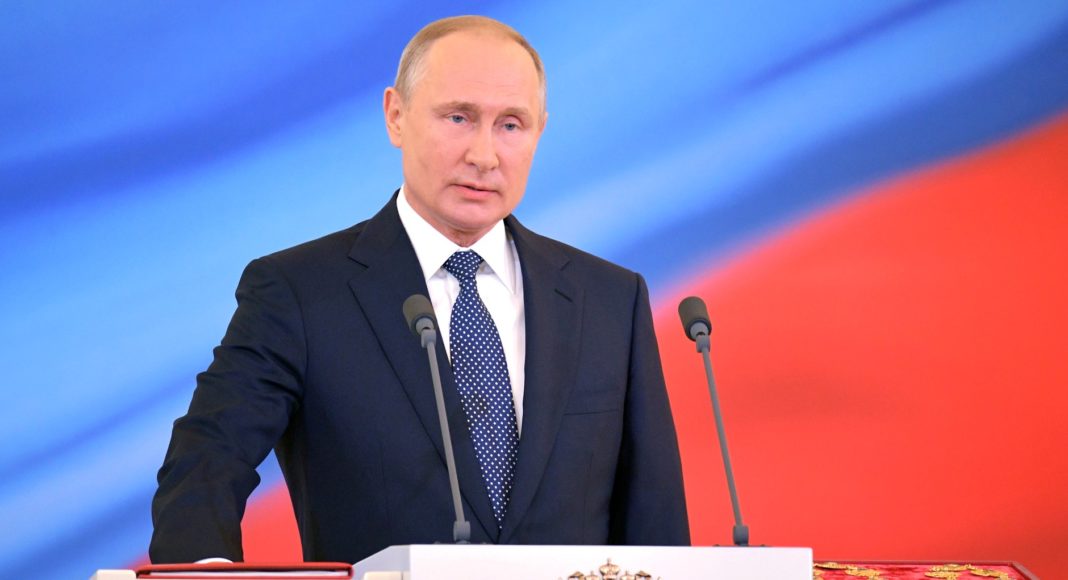
Russian President Vladimir Putin’s loyal lawmakers have cleared the way for him to stay in power at least until 2036 — when he would be 83, and two decades beyond the average life expectancy of Russian men of his generation.
The legislators in both houses of the Russian parliament approved constitutional changes earlier this week that retain the two-term limit on presidents but exempt Putin on grounds that the country needs the continuity and stability that only he is deemed capable of providing.
Putin has been angling to extend his tenure since his last re-election two years ago to a six-year term that was supposed to end in 2024. In January, he unveiled a proposed constitutional overhaul that redistributes power among governing bodies, triggering wide speculation that the amendments were aimed at creating a new supreme leadership position that the 67-year-old Putin could jump to after his current fourth term expires.
Kremlinologists had been musing since the constitutional redraft two months ago over how it would be finessed to keep Putin in power and his oligarchs free from the risk of a more democratic leader attaining power and busting up their corrupt monopolies. Meanwhile, Russia’s economy has been declining for six years as oil prices slump and deprive the national treasury of the income it needs to fund public services.
One notion of how Putin could be kept in office indefinitely was a possible union of Russia with Belarus to form a new country that would hold its first election in 2024, resetting the term-limit clock for any presidential contender. That likely didn’t get traction with Belarus President Alexander Lukashenko, another aspiring leader-for-life in the former Soviet Union.
Or maybe, the analysts speculated, Putin was plotting to shift executive authority from the presidency to the Supreme State Council, a Kremlin advisory body which he could transform into the actual seat of power and rule for another 12 years. Others saw an opportunity for Putin to repeat his hat-trading move of 2008, when he evaded his first barrier to running for a third presidential term by swapping roles with Prime Minister Dmitri Medvedev until the Constitutional changes making the presidential term six years instead of four made Putin eligible to run again in 2012 and 2018.
The pundits were mostly wrong in looking at such constitutional manipulations as cover for the Russian leader’s post-presidency ambitions. It became clear over the past week that the amendments, unlike those announced two months ago, have been modified to further enhance the powers of the already near-omnipotent president. Deputies in the lower house, the State Duma that is dominated by Putin’s United Russia party, used their deliberations Tuesday to stoke fears of social upheaval if the steady hand of Putin was to be wrenched from the helm.
In a choreographed hearing on the constitutional changes, former cosmonaut-turned-deputy Valentina Tereshkova echoed the Kremlin’s warnings that Russia’s enemies, foreign and domestic, were just waiting for Putin to be forced out of his role as protector of the country.
“Given his enormous authority, this would be a stabilizing factor for our society,” said Tereshkova, who became the first woman in space in 1963. She made an appeal for allowing Putin to be eligible like any other Russian citizen to run for the newly revised post of president in 2024.
Putin was called to address the deputies on the notion of his eligibility and invoked the new threats of collapsing oil prices and the coronavirus to bolster their concerns about the supposedly lurking enemies ready to strike if he isn’t there to ensure stability. “They are waiting for us to make a mistake, to slip up, to lose our bearings,” Putin warned. “Or, worse, to get bogged down in internal dissent, which is sometimes fanned and financed from abroad.”
The Duma’s amendments to strengthen the presidency and reset the two-term limit were overwhelmingly endorsed Wednesday by the Federation Council, the Russian upper house.
Putin is now positioned to join the rulers-for-life club whose membership is a Who’s Who of autocracy that includes Chinese President Xi Jinping, North Korean dictator Kim Jong-un, and Turkish President Recep Tayyip Erdogan.
Russia’s Constitutional Court, an institution loyal to Putin, will apply a veneer of legitimacy to the changes with a review of the amendments’ compliance with existing chapters of the Constitution.
Lawmakers announced a “nationwide vote” on April 22 to get the public’s approval. But the vote is neither a genuine election nor a referendum, rather a gesture of support to be televised from orchestrated rallies across the country.
Russians are entering a new age of governance that effectively takes them back to the USSR.
Discover more from Post Alley
Subscribe to get the latest posts sent to your email.
